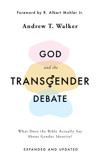
The following Q&As are an excerpt taken from a chapter of Andrew Walker's God and The Transgender Debate.
Much of the answer depends on how we define “harm.” In one sense, identifying as transgender does not “harm” someone in the way that stealing or adultery does.
But “harm” means much more than transactional harm between two persons, because “harm” runs much deeper than what’s on the surface. Individuals can think that an action of theirs produces no apparent harm, but unless they have perfect knowledge (which none of us do), they cannot know that it does not.
It is possible to harm yourself without realizing it. An addict alone in his basement is doing harm to himself even though no third party is being harmed, and even though he may not accept that he is harming himself.
Someone addicted to pornography is doing harm to himself by needing ever more graphic and violent portrayals of sexual acts to be sexually entertained. Moreover, long-term use of pornography inhibits the ability of people addicted to porn to have relationships with the opposite sex—so they are also harming any future spouse of theirs.
"The argument that 'It doesn’t hurt anyone' often ends up simply being 'It doesn’t hurt anyone who agrees with me,' which is not the same thing."
Harm as it relates to someone identifying as transgender has to do with considering whether identifying as transgender promotes lasting health and flourishing. It it not right or good for Christians or churches to promote, or through silence fail to oppose, a worldview that undermines God’s good purpose to bless people individually and in society, which leaves people outside the kingdom of God, and which tells hurting people that invasive medical surgery will be the path to fulfillment when we know (both statistically and from God’s word) that it will not be. It is right and good for Christians and churches lovingly and gently to promote truth, to point to Christ as the means of entering the kingdom, and to point to God’s creation plan as the way to live well in this world as part of that kingdom.
It is worth also saying that often, embracing a transgender identity does hurt other people. If your highest “value” is to avoid doing anything that harms others, then it is worth considering the third parties (parents, spouses, children, siblings) who are hurt by someone’s rejection of their birth sex and their upbringing or their marriage vows. The argument that “It doesn’t hurt anyone” often ends up simply being “It doesn’t hurt anyone who agrees with me,” which is not the same thing.

Helps Christians engage lovingly, thoughtfully, and biblically with discussions on gender identity. Originally released in 2017, this version has been updated and expanded.
Kids and adults struggling to come to terms with their identities may well fear rejection if their parents are Christians or if they are surrounded by a Christian community. We cannot ignore or deny that there are young people who commit suicide or seriously harm themselves because their rigidly religious parents have condemned them or kicked them out of the house. We have to make sure that as individuals and churches we are welcoming, listening, and compassionate (see chapters eight and ten), and acknowledge that we have not always been those things.
But is it then reasonable to conclude that Christian beliefs must put kids who experience gender dysphoria (or, for that matter, same-sex attraction) in danger? Absolutely not.
Quite the opposite is true. It is a fundamental command of Christianity to love others unconditionally. We are called to love even those who insult and hate us. With God’s help, we will love our children, even if they challenge our values. Think of the story of the prodigal son and his boundlessly gracious father. If we are truly to live as Christians, we can only cast ourselves on the Father’s loving forgiveness and extend the same grace to others.
"From a biblical-worldview perspective, it seems far more likely that emotional and psychological distress stem from gender dysphoria."
The Christian gospel offers a third possibility for parents to hold out to children who are struggling with their sexuality to hold out to them—the life of cross-carrying faithfulness, and of finding joy in the struggle. Christianity, while never promising complete liberation from someone’s battles with sin in this life, liberates individuals to experience their truest self, as made in the image of God.
It is an emotionally charged accusation to suppose that disagreement with any given identity or feeling is the cause of someone’s emotional stress. And it raises an important counter-question: is the emotional distress caused from identifying as transgender the result of not being affirmed, or is it a feature of the underlying emotional and mental difficulties that come with gender dysphoria, which are not solved by embracing a transgender identity?
Your presupposition about whether transgenderism is good or not good will tend to dictate how you read the statistics that are available. Someone who affirms or promotes embracing a transgender identity will assume the distress is caused by societal rejection; someone who believes transgender is not in line with God’s good purposes will tend to argue that the distress is caused by the dysphoria and re- sponding to it by adopting a transgender identity.
From a biblical-worldview perspective, it seems far more likely (albeit that it’s unpopular to say) that emotional and psychological distress stem from gender dysphoria, not from the failure to feel affirmed by one’s community. If we believe that it is in living under God’s good rule, in line with how he created us to flourish, that leads to greater fulfillment and wholeness, then we have also to believe that it would be harmful not to speak God’s word into this area, hard though it may be to say and for people to hear.
God and The Transgender Debate helps Christians engage lovingly, thoughtfully and faithfully with one of the greatest cultural discussions of our day.